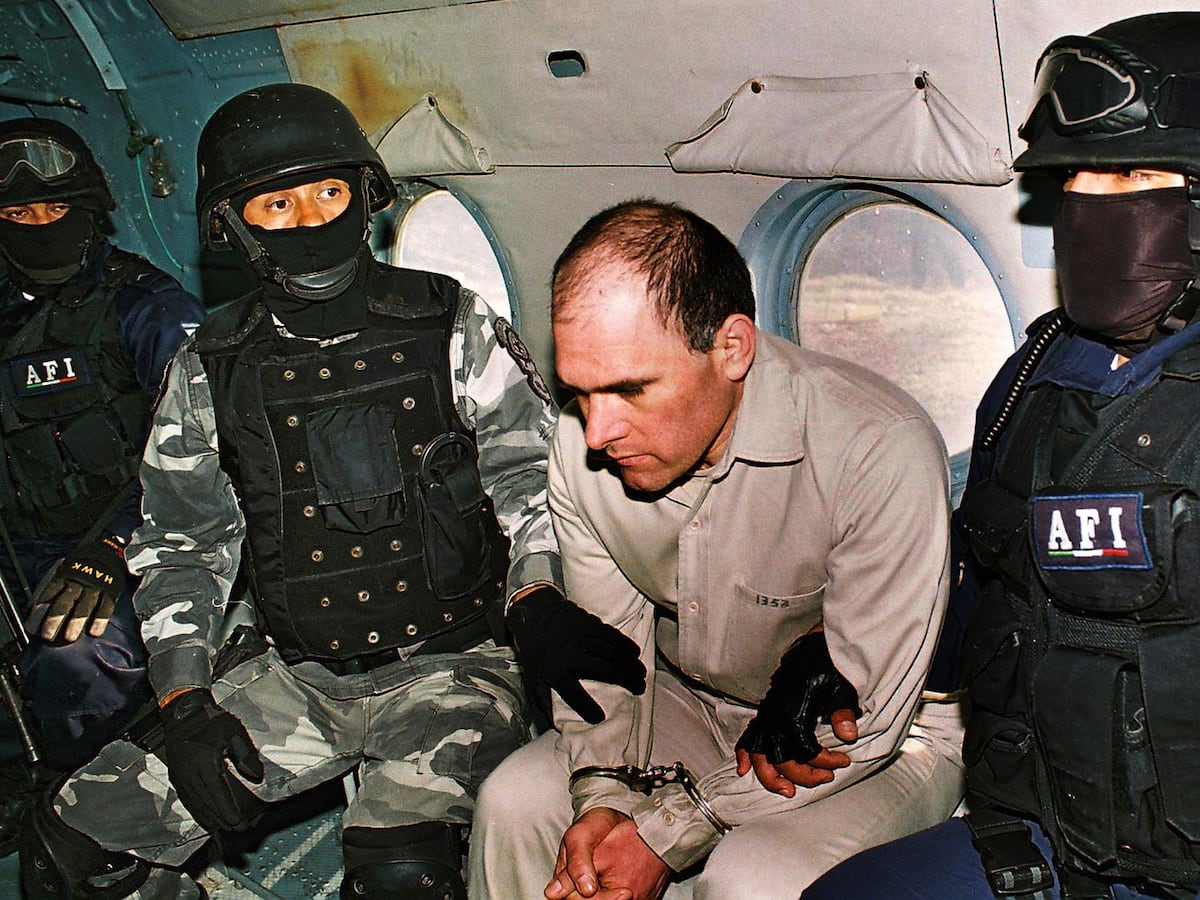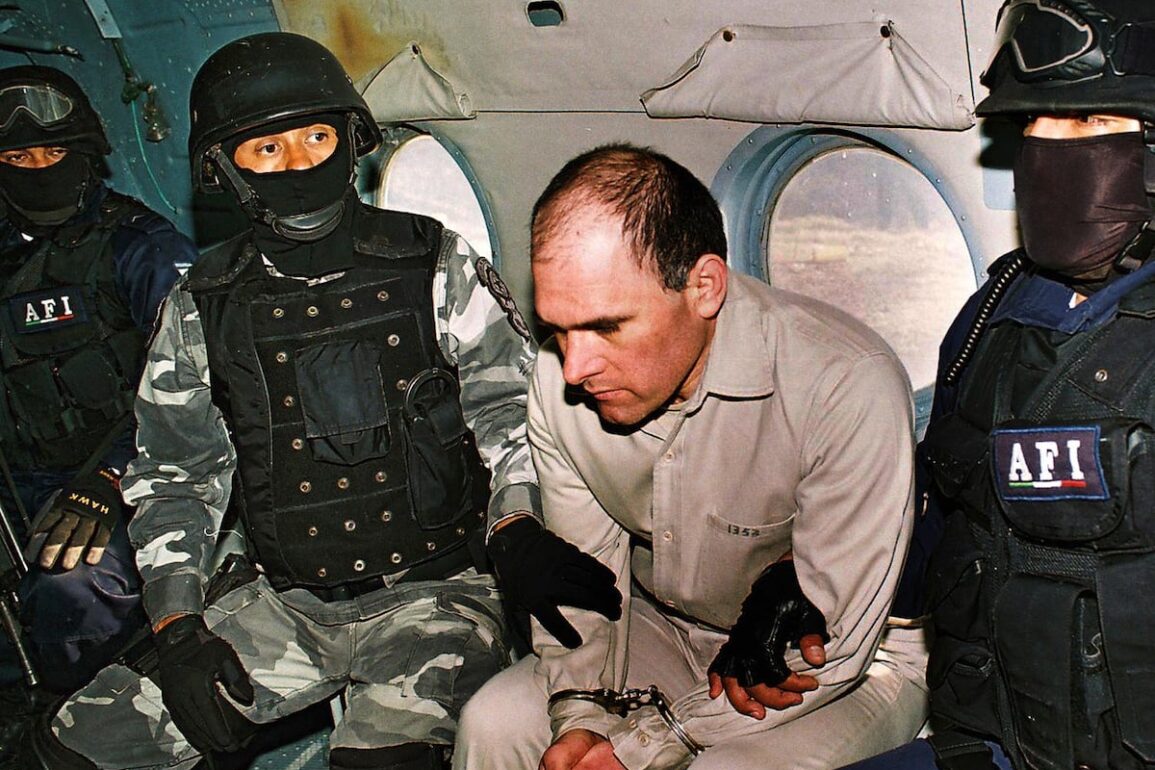
The long wait for Osiel Cárdenas Guillén is over. The 57-year-old drug trafficker, a historical leader of the Gulf Cartel and a key figure in the rise of Los Zetas to the top leagues of the criminal world, was released this Friday after serving a 21-year prison sentence, according to the U.S. authorities.
He was released into the custody of U.S. Immigration and Customs Enforcement (ICE), according to a spokesperson for the U.S. prison service cited by the news agency Reuters, which said that it is not clear if Cárdenas will be deported to Mexico, where he has outstanding charges, or remain on U.S. soil.
Also known as El Ingeniero (The Engineer) or El Mata Amigos (The Friend Killer), Washington accused him of commandeering a vast criminal empire that moved tons of marijuana and cocaine, made millions in profits and sowed terror on both sides of the border during the 2000s.
Cárdenas Guillén was captured in March 2003 in the middle of a shootout that rained fire for hours in the border city of Matamoros (in the Mexican state of Tamaulipas), his hometown and main base of operations. He had been at the head of the Gulf Cartel for at least five years, which has historically dominated the drug routes that enter through southern Texas. The origins of the organization date back to the years of prohibition and the whiskey trade in the 1930s, but its presence surged after it sealed a protection pact with law enforcement in Mexico and an alliance with the Cali Cartel of Colombia in the late 1990s. The Mexican press claims that Cárdenas Guillén earned the nickname El Mata Amigos for being behind the murder of Salvador Gómez Herrera, one of his closest allies and former head of the criminal organization.
The “engineer” started from the bottom: he first worked for the federal police, training dogs to detect drugs, until he rose through the ranks of the criminal group as one of its top lieutenants. At the time of his downfall he was considered the most powerful drug lord in Mexico, with more than 300 men in charge of his security. “A lot was already happening with him,” declared General Clemente Vega, Secretary of National Defense, when he confirmed the arrest, which took place more than two years before the start of the war on drugs that has left hundreds of thousands dead in the last two decades in Mexico.
The boss spent four years in the maximum security prison of Almoloya de Juárez (State of Mexico), the same prison from which Joaquín El Chapo Guzmán escaped in 2015. Despite being behind bars, he remained at the head of the cartel through his lawyers. The State of Tamaulipas, his main fiefdom, was one of the most coveted territories by rival cartels due to its proximity to the United States and its 370-kilometer border with Texas. That was what led him to recruit a group of special forces soldiers as hitmen in the late 1990s: Los Zetas, who burst into Mexico’s criminal geopolitics as the armed wing of the Gulf Cartel.
Cárdenas Guillén was considered a particularly violent criminal boss, who ruled the cartel with an iron fist. The United States also accused him of the attempted kidnapping and murder of a DEA agent in 1999, of an undercover FBI agent who was caught by his men, and of threatening a Texas agent who prevented the arrival of almost a ton of marijuana. The boss also had a knack for business and money laundering, as he commanded a large drug distribution network that extended to large cities such as Houston and Atlanta. During the boom years, he brought in between four and six tons of cocaine each month. He earned $41 million in a three-and-a-half-month period in the Atlanta metropolitan area alone.
The White House had already had him in its sights since the early 1990s, but it did not formally charge him until 2000. It would be another seven years before his extradition to Texas. In 2010 he pleaded guilty to five charges of drug trafficking, money laundering and assaulting a federal agent. The judge sentenced him to 25 years in prison, four of which he served in Mexico and 21 in various U.S. prisons, as well as a fine of $50 million. His last stop was the Terre Haute penitentiary in Indiana, where he was transferred in 2020. In Mexico, the alliance between the Gulf Cartel and Los Zetas, who introduced martial structure and discipline to their old allies, broke down the same year he was sentenced. The break came after several years of tensions, sparked by the murder of Ezequiel Cárdenas alias Tony Tormenta, his brother, accusations of treason and the rise of the Zetas, who became one of the most powerful actors in the early years of Felipe Calderón’s presidency (2006-2012) and the war on drugs.
The payment of the multimillion-dollar fine was an act of “poetic justice,” in the words of the U.S. authorities. Just over $29 million went to 12 Texas police corporations that worked for more than 10 years to see him fall. Each police chief posed in 2012 with a giant check, in sums ranging from $1.1 to $5.9 million. Cárdenas Guillén concealed mountains of cash in basements and other hiding places: the U.S. justice system made at least 10 separate seizures during the investigations, the largest for $4.5 million. Juan Jesús Guerrero Chapa, known as “the drug world’s lawyer” and a key figure in the management of his finances, was murdered in 2013 outside a Texas shopping center, in revenge after it was leaked that he had collaborated with the United States.
The noose around El Ingeniero’s inner circle has tightened since his arrest, including against his family. Osiel Cárdenas Jr., his son, pleaded guilty to arms trafficking in 2022 and was sentenced last year to nine years in prison. Rafael Cárdenas, his nephew, was sentenced to 20 years for drug trafficking and money laundering in 2014. José Alfredo Cárdenas El Contador, his nephew and alleged leader of the Gulf Cartel, was arrested in 2022 upon leaving an amusement park in Mexico City. After multiple delays, a judge gave the green light to his extradition this month, although it still needs to be approved by the Mexican Foreign Ministry. Two of El Contador’s sons, Alan Alexis and Axel Alfredo Cárdenas, were accused of kidnapping four US citizens in Matamoros last year.
In the next few hours it will be decided whether Cárdenas Guillén remains in the United States or is deported to Mexico, where he has several judicial proceedings and arrest warrants in force. In February he obtained an injunction to avoid being arrested for arms trafficking in a case that dates back to 2003. Having served his term on U.S. soil, all eyes are on his pending accounts south of the border.
Sign up for our weekly newsletter to get more English-language news coverage from EL PAÍS USA Edition
This post was originally published on this site be sure to check out more of their content.









